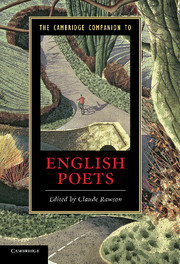Book contents
- Frontmatter
- Introduction
- 1 Geoffrey Chaucer
- 2 Thomas Wyatt
- 3 Edmund Spenser
- 4 William Shakespeare
- 5 John Donne
- 6 Ben Jonson
- 7 George Herbert
- 8 John Milton
- 9 Andrew Marvell
- 10 John Dryden
- 11 Jonathan Swift
- 12 Alexander Pope
- 13 William Blake
- 14 Robert Burns
- 15 William Wordsworth
- 16 Samuel Taylor Coleridge
- 17 George Gordon, Lord Byron
- 18 Percy Bysshe Shelley
- 19 John Keats
- 20 Alfred Lord Tennyson
- 21 Robert Browning
- 22 Emily Brontë
- 23 Christina Rossetti
- 24 Thomas Hardy
- 25 William Butler Yeats
- 26 D. H. Lawrence
- 27 T. S. Eliot
- 28 W. H. Auden
- 29 Philip Larkin
- Further Reading
- Index
18 - Percy Bysshe Shelley
Published online by Cambridge University Press: 28 May 2011
- Frontmatter
- Introduction
- 1 Geoffrey Chaucer
- 2 Thomas Wyatt
- 3 Edmund Spenser
- 4 William Shakespeare
- 5 John Donne
- 6 Ben Jonson
- 7 George Herbert
- 8 John Milton
- 9 Andrew Marvell
- 10 John Dryden
- 11 Jonathan Swift
- 12 Alexander Pope
- 13 William Blake
- 14 Robert Burns
- 15 William Wordsworth
- 16 Samuel Taylor Coleridge
- 17 George Gordon, Lord Byron
- 18 Percy Bysshe Shelley
- 19 John Keats
- 20 Alfred Lord Tennyson
- 21 Robert Browning
- 22 Emily Brontë
- 23 Christina Rossetti
- 24 Thomas Hardy
- 25 William Butler Yeats
- 26 D. H. Lawrence
- 27 T. S. Eliot
- 28 W. H. Auden
- 29 Philip Larkin
- Further Reading
- Index
Summary
Percy Bysshe Shelley was born on 4 August 1792, a month and a half before the proclamation of the First French Republic and three years to the day after the momentous Declaration of the Rights of Man and Citizen by the National Assembly in revolutionary Paris. Since Shelley was the scion of an aristocratic family with whose values he was ever at odds, this latter event has special resonance in his life and work. Unlike the 1776 American Declaration of Independence, with which it is often compared, the 1789 French Declaration involved an abjuration of special political prerogatives on the part of the very persons who held them: the French nobility. Coming of age in England in the post-Revolution period, Shelley, too, attempted very explicitly to live a life of aristocratic self-renunciation, and this intention shaped much of his writing. It is true that if we look at Shelley from the point of view of those around him, allies and enemies alike, we discover he was not entirely successful in this effort. Lord Byron’s intimate friendship with him was almost certainly predicated on the recognition that, like himself, Shelley was well-born. Conversely, William Hazlitt, one of the earliest and harshest of Shelley’s critics, seems to have concluded that, whatever Shelley’s protests to the contrary, he was ultimately a part of England’s aristocratic order. Those protests began early, however, and they lasted Shelley’s brief lifetime.
In 1811, before his twentieth birthday, Shelley would be expelled from Oxford for producing a pamphlet entitled The Necessity of Atheism. He would later write to his free-thinking friend Elizabeth Hitchener: ‘I am no aristocrat, no “crat” at all, but vehemently long for the time when men may dare to live in accordance with Nature and Reason – in consequence, with Virtue, to which I firmly believe that Religion and its establishments, Polity and its establishments, are the formidable though destructible barriers.’
- Type
- Chapter
- Information
- The Cambridge Companion to English Poets , pp. 344 - 359Publisher: Cambridge University PressPrint publication year: 2011
- 1
- Cited by

